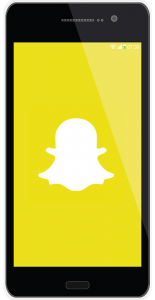
Social media outlets like Snapchat, Instagram and Facebook are fixtures in today’s society. Millennials, especially, seem to use them all day long, including at work or in class. One teacher decided that rather than punish his students, he would embrace the medium and use Snapchat to his advantage.
According to an NPR article, Marist College adjunct professor Michael Britt will take “‘snaps’ of real-life examples of what he’s teaching in class,” and post them to his Snapchat account for students to view. He likes to do this close to times when students are crunching for an exam.
Britt believes that personalized learning is necessary and, in today’s society, the natural course of doing so seems to be using social media. It appears to be working – “[a]bout 90 percent of his students look at and use his Snapchats to study, he estimates.”
There are multiple accounts of students raising grades by studying with Britt’s Snapchats. The NPR article quotes student Salma Metwally as saying, “‘When you’re sitting in an 8 a.m. lecture, it’s hard to listen to a professor. . . [y]ou may be listening, but you’re not processing anything.” With Snapchat, though, “‘it’s easier to retain information there than it is in class.’”
One professor, after becoming frustrated with students constantly checking social media on their phones while in class, adopted the concept and created a Facebook page where she would post course material.
Happy with the results, Nisha Malhotra stated in a Faculty Focus article that “[m]any of the students began participating instantly (though some never signed up). The students quickly formed study groups outside of class, exchanged articles, and helped each other. Overall, they performed better than the non-participating students. . . [n]ot only were the discussions in class livelier, but also the students were more insightful in discussing each other’s research.”
While it may not be the case with every classroom that utilizes social media instead of fighting against it, social media is arguably not going anywhere. Future generations are likely to use it even more.
The social media in the classroom movement may be steadily growing, but students aren’t allowed to use social media or any other materials not allowed by their professors during ProctorU proctored exams. Visit www.proctoru.com for more information.